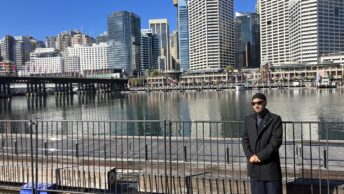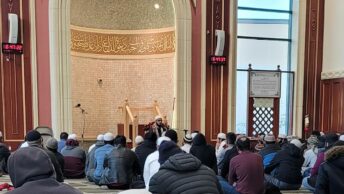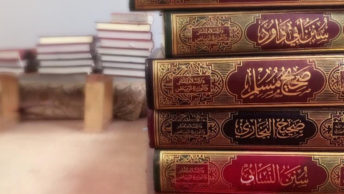(Article taken, with permission, from http://tullabcorner.wordpress.com May Allah reward the author, Ameen)
Dear brothers! I call upon your support and activism to save not hundreds, but millions, from the Hell-fire. There are millions of people around the world who are potentially praying Salah without Wudhu. The first thing they will be asked about by Allah, after their faith, will be Salah, and they are performing it without its most basic requirement! This is because they are not performing Wudhu even after blood comes out from their bodies. It is clear that bleeding breaks Wudhu and having nose-bleeds or cuts, etc., is something so common that no human being has probably ever evaded it. However, there are people who believe this does not break their Wudhu and go on to pray Salah. Not only that, but some of these people are even Imams in Masjids and may go on to lead others in prayer after invalidating their Wudhu. The punishment for missing one Salah is to burn in Hell-fire for one Huqb, and the Ulama have even said that praying Salah without Wudhu, in some cases, can equate to, or lead to, Kufr. We must act now to save the Salah of so many people. How much longer can we stand and watch so many people continue to live with this false assumption? O scholars amongst you, you shall be questioned regarding this on the day of Judgement.
To anyone who has had any interaction with traditional Islamic jurisprudence (Fiqh), the paragraph above will come across as complete rubbish and bigotry. It is inflammatory because it is inciting tension in a matter which is a legitimate and recognised difference of opinion. The Shawafi’ will not deem Wudhu void due to bleeding and Hanafi’s will, and they are all happy to live with each other regardless. Well, should our reaction not be a similar one of surprise and bewilderment when we here people making similar statements regarding their Fiqhi opinions on modern-day issues? How many times have we seen literature, heard lectures and been spoken to about how our Eids are being celebrated on the wrong day and how many people prayers are not accepted as they follow a certain opinion regarding the Isha prayer?
So, here we go again, another article about the Moon and twilight prayers, but I’ll try my best to keep steer clear of all the technicalities. Suffice to say that the current debates regarding the beginning of lunar months and certain daily prayers have much to do with the significance of astronomical calculations and to the extent of their significance and import on deciding such matters. Or, which astronomical phenomena correspond with ones mentioned in Islamic texts. When these matters are looked at objectively, turning a blind-eye to the political issues and the “mud-slinging”, there are credible and legitimate Fiqhi evidences on both sides. It is inevitable that most of us will side one way or the other after hearing both sides, but how can we deny that the other side has proof, as weak as it may seem to us? Those of us who have read about traditional Fiqhi issues will find many similarities between them and the ones at hand. Two different opinions have been formed using two different, but credible, forms of Ijtihad. One side may seem weightier from some angles, whilst other will seem weightier from others. For example, one side may have a relatively more authentic Hadith, whereas the other side may be presenting a Hadith which seems more relevant and explicit. Eventually, the Mujtahid will have to use his educated discretion to make an educated, yet humble, decision between the two. Mujtahids have always had to do this, choosing one with the caveat that the opposing opinion is wrong with the possibility of it being correct.
Your first point of reference in traditional Fiqhi issues may be the Sahabah, the four famous Imams, the likes of Ibn Taymiyah, Nawawi, Ibn Humam, or even later scholars like Ibn Abidin, Ashraf Ali Thanwi, Rashid Ahmad Gangohi, Raza Khan Berelwi, Ibn Uthaymin and Ibn Baaz[1]. Whichever era’s scholars you refer to most, it is my suspicion that those very scholars, had they been alive today, would probably have held as contrasting views on these issues as contemporary scholars do. It is the nature of Furu’aat and Fiqh that they are conducive to differences. The story of Banu Qraydhah is famous when the Prophet (SAW) allowed the Sahabah to differ on the matter of praying Asr without saying who’s right. From then, up until today, how many Fiqhi issues have reached complete unanimity and consensus? Wherever there has been the slightest ambiguity in the words of the Creator or his messenger (SAW), it has led to a plethora of opinions. Yes, some opinions are signed to the history books, but rarely does one opinion prevail to such an extent that no other is acted upon.
Ghayr Muqallids have always received stick for bashing the institution of Taqleed. They are accused of not understanding the obvious fact that there will be differences of opinion in Fiqh, that there will be differing Ijtihads, differing Mujtahids, and that the lay person is allowed to do Taqleed of whoever he trusts. If someone believes that, why would he change the goal posts when it comes to astronomical issues? Have they suddenly become Qat’iy and lost all room for Ijtihad? Or, have we lost our senses a bit and come close to becoming the very monster we once used to warn others of?
The view that differences in opinion cannot be tolerated, even in matters of Fiqh, is one which is adopted by a small group of the Ummah. The irony is though, that many of the people who argue and fret about these astro-fiqhi issues and how we need unity and how only one opinion is valid and worthy of acting upon, are often the same people that will give you lengthy explanations about how it is important to do Taqleed of any Imam and how Ikhtilaaf of Ulama is a mercy. It is ironical that the loudest noises in this debate belong to the people who vehemently support Taqleed of Fiqhi Mathabs. Do they not realise that one of the important pillars of the theory which supports the permissibility of following Fiqhi Mathabs is that people can be allowed to followed opinions which you personally believe to be wrong and that a person who has performed Ijtihad in an issue can be followed by others as well. However, when it comes to contemporary issues, it is these same people who can’t seem to tolerate a difference in opinion and try to force others out of their previous Taqleed and onto their own opinion based on their proofs. I fail to see how this isn’t double standards when they detest and complain about people who do the same in issues such as joining the feet in congregational prayer.
So, why the difference? My argument is not that the Fiqhi matters at hand are any different in nature to those of the past, rather the way we are dealing with them. In my, albeit limited, study of history, I can’t recall any of the four Imams slandering one another or initiating missions to convert people to their way of thinking. Yes, they argued strongly for what they believed to be right, but didn’t expect others to follow them or warn against those they disagreed with. They had utmost respect for their adversaries and it is even reported that they followed them out of respect on occasions. If there are any isolated examples of Fiqhi evangelism in Islam’s history, it will be an anomaly and not something we really want to be replicating. I cannot imagine any of our four great Imams publishing literature or holding public gatherings with the intention of drumming-up support for their own Fiqhi stance or to show the weakness of their adversary’s. The idea of giving Da’wah towards your own personal or shared, stance on a Fiqhi issue seems to be new one with limited historical precedence, if any.
Ijmaa is given great importance by scholars. However, is Ijmaa not a naturally occurring phenomenon when all the scholars of an era unanimously, but coincidentally, reach the same conclusion on an issue. Since when was Ijmaa brought about by convincing scholars to suppress their views and sign-up to an opinion held by others, even if they outnumber others? Traditionally, when a matter of Fiqh has been the subject of discussion and Ijtihaad, every Mujtahid has had the right to hold his opinion and have followers. Islam has not practiced excommunication of scholars and their followers based on their opinions in ambiguous matters of Fiqh. Putting the point into context, if there are three different scholars in the same town who have researched the issue of when the morning-prayer starts, each one has the right to his opinion. If people ask him about it, he has the right to tell about his research and they have the right to follow him. It is another matter that the management of mosques may decide to hold their prayers according to the view of one particular scholar, or by the most common opinion, but scholars who disagree have the right to their own opinion and followers. From where have we developed this notion that there must be unity in Fiqh? Yes, Muslims should be united in their creed. Some will also argue that they must be united politically, but on what grounds do we say that we must all be united on Furoo’iy matters of Fiqh?
Usually, people argue that the Eid and Salah issues are grave and the validity of people’s worship is at stake. However, since when was this anything new? Have the four Imams not differed on the beginning time of some prayers? Have they not differed on what validates Wudhu and what doesn’t? Have they not differed on and what makes something Halal to eat or not? So, why is it unacceptable that Fuqaha should now differ on the beginning time of some prayers and the date of Eid?
Some will say that the issues in which the four Imams differed in were Mujtahad fih, hence there is no need to be strict or criticise others. Personally, I can’t think of a better living example of a matter which is Mujtahad fih than the Eid and prayer-time issues, so why can we not treat them the same? Moreover, Ulama mentioned that to reprimand someone in a matter which is the subject of a difference of opinion is a munkar (reprehensible act) in itself. How can we then go and criticise those who pray Isha or Fajr at a different time to us, or those who celebrate Eid on a different day, when we know there are large numbers of scholars on both sides? Is it actually permissible for us to do so?
Some people say that this is not a matter of Fiqh, rather a political matter with personal interests involved. However, I cannot understand this logic either, as I was also taught that two wrongs do not make a right. If one side accuses the other for politicising an issue, how does doing as they do help de-politicise it? If we suspect, or even have proof, that there are political motives or influences behind a particular stance, is it not a scholar’s duty to give the benefit of the doubt and treat his adversary with respect? If there is no room left for Husn al-Thann, it would seem that mere professionalism and manners, or Adab, would demand that such things not be brought to the fore? In the matters at hand, there are valid proofs from the Sharia on both sides, so there is no need for one side to label the other’s stance as political, even if it is. Moreover, doing so is counter-productive and “adding fuel to the fire”.
A big factor in this regards is that we have let this matter spill out into the public domain. What is the need for us to stir public tension in matters of Fiqh? How can we even expect the public to make sound judgements in this regards? Even if a person is informed of all the evidences from both sides, it requires a broad and deep understanding of the principles of jurisprudence for a person to be able to make a judgement. If educated and experienced Ulama are unable to come to a consensus, despite going through the same education systems and being overtly religious, how can we expect the issue to be resolved by involving the public? It is inevitable that it will simply became a question of who can present their case most effectively and eloquently as the audience is not equipped to ascertain evidential strength. Do we want to make Fiqh like modern politics where form prevails over substance?
Okay, it may be argued that reputable Ulama of the recent past have spoken out against, and written about, things like praying 8 Raka’at in Tarawih, etc. From what I can understand from these Ulama, it is not the individual acts or issues which concern them, rather the mind-set that usually lies beneath them; the inability to respect others’ opinions, the habit of accusing other of being wrong, etc. These are, however, exactly the traits that are being developed as a result of the publicity the Moon and prayer-time issues.
In the West, we see Muslim communities collated from vastly diverse backgrounds. They speak different languages and follow different schools of thought in Fiqh. Each community is like a microcosm of the whole Ummah. The Ummah has stuck together by accommodating its differences and the same spirit must be maintained locally. We not need to look at our own localities and communities with the same open heart and mind that we look at the rest of the Ummah with. If we can tolerate so much diversity on a macro-level, should we not do the same locally? How else can we expect to carry on peacefully?
Now, there’s one other issue on my mind that needs answering. We often hear that our Eid must be on one day and that we can’t continue living divided like this. We are made to believe that all other Fiqhi differences can be tolerated but two Eids is second only to having two gods. I know scholars have put much emphasis on this and for good reason. I totally agree that it would be wonderful thought to have everyone celebrating Eid on one day. Moreover, the Prophet even encouraged us to bring everyone along to the Eid prayer, further implying the need for unity. However, what is of greatest importance is that Muslims’ hearts are united. I’m not going to argue with those who say that it is more important to have one Eid than to do it on the correct day. However, I see it as extremely unlikely and difficult to achieve. Historically, the people with political or legal authority would simply decide and enforce their opinion. However, there is no Muslim political authority to do so for Muslims in Britain. We have tried to substitute that authority by making committees, organisations and boards but they are eventually contradicted by other groups set-up to do the same thing. The experiment hasn’t worked. Maybe there is something wrong with it? Maybe we need to take another approach?
What I am trying to say is that celebrating Eid on the same day does not seem at all realistic to me. However, in the hope that we may be able to do so, are we overlooking the need to stress other relevant points, like the ones mentioned above? By us talking so much about the need to have a united Eid, are we not further drawing people’s attention away from more important issues like respecting others’ opinions? I look forward to the day we can all happily celebrate Eid together, but hope we don’t compromise on other important principles to achieve that. I can envisage a more harmonious Muslim community here in Britain celebrating Eid on different days, if each group is happy to respect the other. This is obviously a compromised and un-favoured position, but it may be the best one considering current circumstances.
Let me give some anecdotal examples to support my point. In a particular town in Britain where there are tensions regarding moon-sighting, coincidentally one year both groups ended up celebrating on the same day. This brought no amazing reconciliation between both sides, nor paved the way for a better future. Yes, it was a novelty that everyone celebrated on the same day, but it had no effect on community relations.
On the other hand, I know families where different brothers usually celebrate on different days and both families enjoy visiting each other’s houses on respective days, enjoying the extended happiness instead of feeling divided. I know it is unprecedented but so are the causes of the difference. In any case, I see this as a much better alternative to the ever-increasing tension in the unrealistic hope that the other side may one day give-in.
Now, there’s the issue of us needing to unite for other practical reasons so that we can have a unified holiday from school. Many of us say that the councils will stop giving us school holidays if we cannot unite. If we can get them to close for one day, how impossible is it for them to stretch that to two if we can prove through theory and practice that there are two legitimate opinions and practices which the Muslims cannot, due to religious reasons (i.e., there respect for Ikhtilaaf and the right of a Mujtahid for Ijtihad), unite. If they don’t swallow it, how big of a deal is it? Many boroughs still today have their schools open on Eid day without spoiling the Eid of their Muslim students and most of us grew up without our schools closing for Eid anyway. It’s a small sacrifice to make to uphold our religious practices in a predominantly secular society. Just for the luxury of having the school closed for a day, shall we continue to politicise the moon issue?
The issue of prayer times is not too different either. I know people often have this paranoia about how people will get confused if there isn’t one single time table that the whole country follows. It is definitely a nice thought but not the biggest problems our communities have. Yes, many of us may be from less multi-cultural parts of the world where one Mathab in Fiqh is also prevalent. However, this is something easily worked around. Shafi’ies and Hanafi’s have in the past worked out a ways of living together peacefully and harmoniously. The new generation is far from illiterate and will, insha’Allah, understand that there are differing timetables due to differing opinions and it is from the beauty of Islam that this does not cause us to fight. They will grow up knowing that this Mathab follows this timetable and that mathab that one. If a mosque committee wants to take one ‘Alim’s timetable and print it, let them. If the local people want to follow that, let them. If it’snot based on a legitimate Ijtihad, all the Ulama will unite against it naturally anyway. Didn’t Imam Malik refuse for his Mathab to be made the official Mathab? The ‘Ulama have their own positions and have the right to produce research and the right to have followers. Again, in our dream of having one simple timetable, are we forfeiting the Ulama’s right to differ?
Okay, some of you might say that being so accommodating to Ikhtilaaf will open the doors for chaos. Tomorrow, we’ll have to accommodate wacky views which have no basis. Through Allah’s grace, we know the Ummah has not reached such lows that it takes any such rubbish on board on such a wide scale. We are only discussing this issue to this extent as we believe both sides have some valid points to make. Besides, that fear has been there throughout history so why should we surrender to it now and try to remove Ikhtilaaf? When we allow the Ulama to have differences where the issues are Ijtihadi, we can then respect them all as a body, with their differences. Then, they themselves will keep us safe from the dangerous and absurd views by uniting against the absurd opinion.
After all this talk about the inevitability of difference, some of you may be thinking “I thought Islam was supposed to bring us certainty and conviction, not just endless debate. You are right, but only to a certain extent. There are plenty of things that are just that, certain. There’s no room to disagree that Allah is one, that Muhammad is his final messenger, in the Day of Judgement, in the punishment of Hell and the bounties of Paradise. In the realm of Fiqh, there is no Iktilaaf in the importance of Salah and fasting, in the harm of alcohol, usury, fornication, and the list goes on. However, why do we spend our time being concerned about the smaller issues which can be differed in? A pious saint once said “if you don’t spend your time doing what you’re supposed to be doing, you’ll be forced to spend it doing things you’re not supposed to be doing”. If our efforts were genuinely focused on the above mentioned issues of consensus, I very much doubt we would have time to call people towards following our own preferred school of thought in Fiqhi Furu’aat. Yes, scholars should certainly exert themselves to reach the bottom of every matter, but their public efforts are probably more wisely used in greater issues.
So, after all of that, this is what I suggest and plead: let’s collectively put this issue back in perspective and de-politicise it. Let’s actively tell our people that this is a genuine Ikhtilaaf and we have no plan to try and eradicate it, even though it seems more convenient for it not to exist. Let’s actually tell our followers off if they begin to stir tension on these matters. Let’s educate our masses about Adab al-Ikhtilaaf so they will be equipped to deal with other similar issues that will no doubt arise in the future. Let’s not call each other’s opinion invalid and actually believe in our hearts that the other opinion is potentially right, even though I believe it to be incorrect. Let’s pretend there are no politics involved even if we suspect there to be and rise above it through our Adab and professionalism. Let’s give everyone the choice to make a genuine Fiqhi decision in all of these matters and follow that happily. This means the layman is free to follow whichever scholar he trusts most and the educated person may follow his conviction. Let’s not force people to pray Salah or celebrate Eid according to socio-political affiliations, rather according to what they see stronger or following whichever scholar they see most worthy. I was told about a Mosque in the North of England (Masjid Zakaria, Dewsbury) where they have been holding Eid prayers on both days, happily and peacefully, for years. Let’s focus on the bigger issues of the Ummah and not let Satan divide us on Furu’aat. Let us stop using media-style methods to get our point across and be more academic. Let’s just stop calling people to follow us in Furu’. Let the scholars follow the example of the pious predecessors who people followed without them having to canvass for supporters or run campaigns like political parties. Let us take this message and rub mud in Satan’s face by spreading it throughout the Ummah. Let the scholars remind themselves of their responsibility to be united, despite their differences. Let us wake up.
If you find fault with what I am saying, please do let me know. I stand to be corrected. If not, it’s time we changed our perception and re-framed the debate.
[1] I have intentionally refrained from attaching titles to any of the personalities mentioned to avoid even the apparent symbols of bias.






